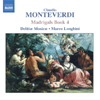Monteverdi Madrigals, Book 4
Can Longhini’s countertenors compete with Alessandrini’s sopranos?
View record and artist detailsRecord and Artist Details
Composer or Director: Claudio Monteverdi
Genre:
Vocal
Label: Naxos
Magazine Review Date: 10/2005
Media Format: CD or Download
Media Runtime: 74
Mastering:
Stereo
DDD
Catalogue Number: 8 555310

Tracks:
| Composition | Artist Credit |
|---|---|
| Madrigals, Book 4 (Il quarto libro de madrigali) |
Claudio Monteverdi, Composer
Claudio Monteverdi, Composer Delitiae Musicae Marco Longhini, Conductor |
Author: Fabrice Fitch
In one of the first of Monteverdi’s supreme achievements, his Fourth Book of Madrigals, Concerto Italiano are a hard act to follow. But the all-male ensemble Delitiae Musicae promise something distinctive. They are joined by a harpsichord and theorbo, which may surprise some listeners; it’s just one of those things that is better documented historically than modern-day performance practice would suggest.
The approach is more studied, tempi are slower, and pauses between musical ideas and text phrases may be stretched out very long indeed. This lingering over details, atomising the musical argument into its constituent units, is reminiscent of Alessandrini but it is often here taken to greater lengths than he attempts, even at his most concentrated. The result is not always quite so convincing, however accomplished the singers. There is a question whether these countertenors summon quite the urgency (either emotional or rhythmic) that Monteverdi demands. Conversely, when the music cools, the beauty of the sound seems almost to mesmerise the performers, who seem to lose sight of the wood for the trees.
Then again, beauty there certainly is and Delitiae Musicae reveal an at times unexpected, reflective side to the music (as in ‘Voi pur da me partire’) that makes an interesting alternative to Concerto Italiano. The latter may have the edge technically, for in the smallest details Longhini’s singers are not so consistent (for example, try the tuning of the unison cadence at ‘l’anima spiro’ of ‘Cor mio mentre vi miro’); but as Naxos’s contributors to such essential repertoire as this, one can hardly fail to give them a hearing.
The approach is more studied, tempi are slower, and pauses between musical ideas and text phrases may be stretched out very long indeed. This lingering over details, atomising the musical argument into its constituent units, is reminiscent of Alessandrini but it is often here taken to greater lengths than he attempts, even at his most concentrated. The result is not always quite so convincing, however accomplished the singers. There is a question whether these countertenors summon quite the urgency (either emotional or rhythmic) that Monteverdi demands. Conversely, when the music cools, the beauty of the sound seems almost to mesmerise the performers, who seem to lose sight of the wood for the trees.
Then again, beauty there certainly is and Delitiae Musicae reveal an at times unexpected, reflective side to the music (as in ‘Voi pur da me partire’) that makes an interesting alternative to Concerto Italiano. The latter may have the edge technically, for in the smallest details Longhini’s singers are not so consistent (for example, try the tuning of the unison cadence at ‘l’anima spiro’ of ‘Cor mio mentre vi miro’); but as Naxos’s contributors to such essential repertoire as this, one can hardly fail to give them a hearing.
Discover the world's largest classical music catalogue with Presto Music.

Gramophone Digital Club
- Digital Edition
- Digital Archive
- Reviews Database
- Full website access
From £8.75 / month
Subscribe
Gramophone Full Club
- Print Edition
- Digital Edition
- Digital Archive
- Reviews Database
- Full website access
From £11.00 / month
Subscribe
If you are a library, university or other organisation that would be interested in an institutional subscription to Gramophone please click here for further information.




